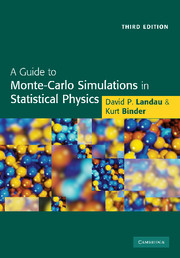Book contents
- Frontmatter
- Contents
- Preface
- 1 Introduction
- 2 Some necessary background
- 3 Simple sampling Monte Carlo methods
- 4 Importance sampling Monte Carlo methods
- 5 More on importance sampling Monte Carlo methods for lattice systems
- 6 Off-lattice models
- 7 Reweighting methods
- 8 Quantum Monte Carlo methods
- 9 Monte Carlo renormalization group methods
- 10 Non-equilibrium and irreversible processes
- 11 Lattice gauge models: a brief introduction
- 12 A brief review of other methods of computer simulation
- 13 Monte Carlo simulations at the periphery of physics and beyond
- 14 Monte Carlo studies of biological molecules
- 15 Outlook
- Appendix: listing of programs mentioned in the text
- Index
13 - Monte Carlo simulations at the periphery of physics and beyond
Published online by Cambridge University Press: 28 February 2011
- Frontmatter
- Contents
- Preface
- 1 Introduction
- 2 Some necessary background
- 3 Simple sampling Monte Carlo methods
- 4 Importance sampling Monte Carlo methods
- 5 More on importance sampling Monte Carlo methods for lattice systems
- 6 Off-lattice models
- 7 Reweighting methods
- 8 Quantum Monte Carlo methods
- 9 Monte Carlo renormalization group methods
- 10 Non-equilibrium and irreversible processes
- 11 Lattice gauge models: a brief introduction
- 12 A brief review of other methods of computer simulation
- 13 Monte Carlo simulations at the periphery of physics and beyond
- 14 Monte Carlo studies of biological molecules
- 15 Outlook
- Appendix: listing of programs mentioned in the text
- Index
Summary
COMMENTARY
In the preceding chapters we described the application of Monte Carlo methods in numerous areas that can be clearly identified as belonging to physics. Although the exposition was far from complete, it should have sufficed to give the reader an appreciation of the broad impact that Monte Carlo studies has already had in statistical physics. A more recent occurrence is the application of these methods in non-traditional areas of physics related research. More explicitly, we mean subject areas that are not normally considered to be physics at all but which make use of physics principles at their core. In some cases physicists have entered these arenas by introducing quite simplified models that represent a ‘physicist's view’ of a particular problem. Often such descriptions are oversimplified, but the hope is that some essential insight can be gained as is the case in many traditional physics studies. (A recent, provocative perspective of the role of statistical physics outside of physics has been presented by Stauffer (2004).) In other cases, however, Monte Carlo methods are being applied by non-physicists (or ‘recent physicists’) to problems that, at best, have a tenuous relationship to physics. This chapter is to serve as a brief glimpse of applications of Monte Carlo methods ‘outside’ of physics. The number of such studies will surely grow rapidly; and even now, we wish to emphasize that we will make no attempt to be complete in our treatment.
- Type
- Chapter
- Information
- A Guide to Monte Carlo Simulations in Statistical Physics , pp. 401 - 418Publisher: Cambridge University PressPrint publication year: 2009



